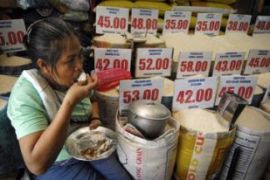Japan boosts food aid ahead of G8
Additional $50m in aid to poor countries as global food prices continue to soar.

On Monday Japan plays host to a three-day annual meeting of leaders from the Group of eight (G8) leading industrialised nations on the northern island of Hokkaido.
Measures to tackle soaring global food prices are set to be among the top items on the agenda, alongside concerns over the surge in the price of oil, measures to tackle climate change, and delivering on a 2005 pledge to double aid to Africa.
Prices of corn, wheat, rice, soybeans and other agriculture products have all skyrocketed with the rise blamed on factors such as high oil prices, changing diets, expanding populations, extreme weather, growth in biofuel production and financial speculation.
The soaring price of food has triggered protests around the world and raised fears that levels of malnutrition could escalate dramatically.
Earlier this week a report from the World Bank warned that 73 million people could be tipped into poverty by rising food prices alone.
It said grain prices have more than doubled since January 2006, while the price of rice, a staple food for more than half the world’s population, has more than tripled between January and May 2008.
Climate change
Among other issues up for discussion at the G8 meeting are measures to tackle global warming.
Climate change activists have said it is up to the G8 nations, as the world’s top industrialised powers, to lead the way in reining in emissions.
Together the G8 nations – France, Italy, Germany, Japan, Canada, Russia, the UK and the US – account for a third of the world’s greenhouse gas emissions.
However, on Thursday the top United Nations climate change official said he was pessimistic that any kind of breakthrough would be achieved at the Hokkaido meeting.
Speaking to the AFP news agency, Yvo de Boer, Executive Secretary of the UN Framework Convention on Climate Change, aid he doubted G8 leaders would be able to agree on a target for the reduction of greenhouse gases by mid-century.
The UN intergovernmental panel of climate change scientists has insisted on the “absolute necessity” of a 50 percent reduction by mid-century if climate change is to remain manageable.
To meet that target, de Boer said, it was essential to set medium-term goals for reducing carbon emissions by 2020.
“We really need that focus from the rich nations on 2020 – it is necessary to give a strong signal to the private sector,” he said.